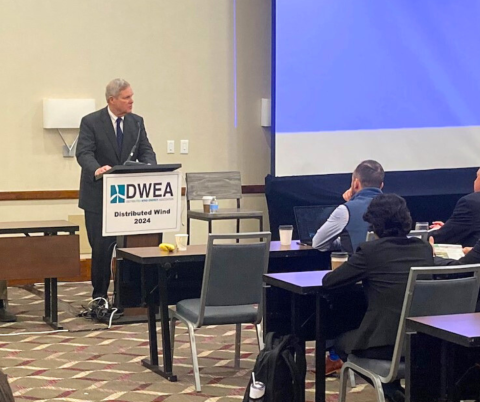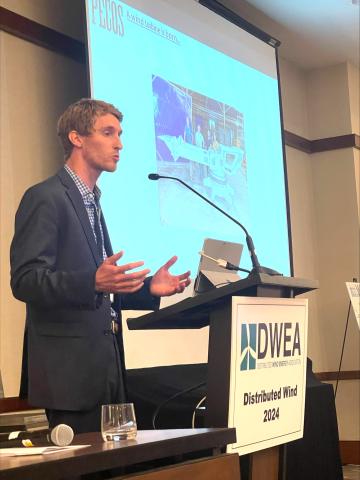Maine already poised to participate thanks to
partnerships established in 2023
WASHINGTON, Feb. 26, 2024 – The U.S. Department of Agriculture (USDA) and the U.S. Department of Energy (DOE) today are launching a new initiative to help farmers cut costs and increase income using underutilized renewable technologies including smaller-scale wind projects. Through the Rural and Agricultural Income & Savings from Renewable Energy (RAISE) initiative, USDA is setting an initial goal of helping 400 individual farmers nationwide deploy smaller-scale wind projects using USDA’s Rural Energy for America Program (REAP).

Today’s announcement has the potential to make wind energy more accessible in Maine, according to USDA Rural Development Maine State Director Rhiannon Hampson. “This partnership between USDA and DOE creates new funding, technical assistance, and research and development opportunities,” said Director Hampson. “In Maine, we already offer free technical assistance to farmers and small businesses pursuing distributed wind energy through our REAP TAG program. Thanks to the Inflation Reduction Act, and the new RAISE initiative, USDA will ensure that more farmers and other rural businesses can save money and earn income from distributed renewable energy technologies. These infrastructure improvements help protect the environment and combat climate change, providing tangible benefits to all Mainers.”
In 2023 USDA Rural Development in Maine awarded a REAP Technical Assistance Grant (REAP TAG) of $152K to Pecos Wind Power Inc. The company designs, builds, and sells wind turbines for distributed generation. Increasing the use of wind-generated power was one priority for the 2023 REAP TAG program, and the company was a successful applicant. Thanks to its USDA REAP TAG funding, Pecos Wind Power now offers free technical assistance to Maine farms and small businesses to help them plan wind generation projects and complete REAP proposals to help fund those projects.

Native Mainer Josh Groleau, co-founder and CEO of Pecos Wind Power Inc., attended the Distributed Wind Energy Association conference in Arlington, VA today where the new RAISE initiative between USDA and DOE was announced by USDA Secretary Tom Vilsack. “This is a very logical collaboration,” he said. “The DOE brings technical expertise and knowledge of wind turbine technology, while the USDA brings the needs and requirements of farmers. Together, the two agencies can bring serious economic benefit to farmers through the deployment of distributed wind power.” Pecos Wind Power Inc. offers support to farms and rural small businesses throughout Maine.
USDA’s REAP TAG program is now in its second year. Maine Rural Development is accepting REAP TAG applications from technical assistance providers through March 15th, 2024. Contact Katrina Shaw, USDA RD Maine State Energy Coordinator (katrina.shaw@usda.gov or 207-990-9129) with questions about the REAP program or REAP TAG.
Background:
Although people may imagine massive turbines on hillsides when thinking of wind power, so-called distributed wind projects vary in scope. A project might entail a single wind turbine to meet a farm’s energy demand and save and stabilize electricity costs. It could also include a few wind turbines across several farms to support a local electricity utility, thereby earning a revenue stream for the hosting farms.
Distributed clean energy projects can create cost savings and income for farmers and rural small businesses. They also support energy independence, local electric grid reliability, and enhance resilience by providing back up power, especially when it is paired with energy storage. These projects also create jobs and investments in rural economies, with approximately a third of a renewable energy project value usually invested in the local communities through construction jobs and maintenance. These projects also allow farmers, rural electric coops, and food companies to address climate change.
The initiative announced today is only possible because of President Biden’s Inflation Reduction Act, which provided more than $144 million in grant funding for underutilized technologies through the REAP program.
Initial RAISE initiative activities, focused on smaller-scale or distributed wind, are expected to include:
- USDA providing additional technical assistance to support applications for the use of the $144.75 million in grant funding from the Inflation Reduction Act for REAP underutilized technology projects, including farmer-owned smaller-scale wind projects, small-scale hydropower, geothermal, biomass-based and other clean energy.
- DOE’s Wind Energy Technologies Office calling for proposals for up to $2.5 million under the Distributed Wind Competitiveness Improvement Project (CIP), which funds distributed wind technology development, testing, certification, and commercialization.
- USDA and DOE hosting a joint webinar series to provide information to farmers, rural electric cooperatives, farm associations, and small-scale, distributed wind providers about our programs and how to use them to develop place-based wind projects. The first webinar in the series will launch a new National Distributed Wind Network and Resource Hub on March 14, 2024.
- USDA and DOE developing a farmers’ guide to distributed wind power that will include technical, economic, and geospatial analysis regarding distributed wind technologies and applications as well as ways to finance smaller-scale wind projects.
- DOE will invest a total of $4 million in related funding, with $2.5 million to support the testing, certification and commercialization of the latest distributed wind technologies including for the agricultural sector, and $1.5 million to support outreach and the identification and development of new business models for farmers to save money and earn income deploying these technologies.
###
USDA is an equal-opportunity provider, employer, and lender.
